- Home
- Robin Hobb
Mad Ship Page 3
Mad Ship Read online
Page 3
Some of the sailors, perhaps, had deserved their violent deaths, as men judged such things. But what of Mild, who had befriended Wintrow, and the fiddler Findow and fun-loving Comfrey and the other good men? Surely, they had merited a kinder end. The Vivacia had not been a slaver when they signed aboard. They had remained aboard her when Kyle had decided to put her to that use. Sa’Adar, the slave priest freed in the rebellion, believed that all who had died had deserved it. He preached that by working as crew on a slaveship, they had become the enemies of all just men. Wintrow felt himself deeply divided on that. He clung to the comforting idea that Sa did not demand he judge others. He told himself that Sa reserved all judging for himself, for only the creator had the wisdom to be judge.
The slaves on board did not share Wintrow’s opinion. Some looked at him and seemed to recall a soft-spoken voice in the darkness and hands with a cool damp rag. Others saw him as a sham, as the captain’s son playing at mercy but doing little to free them until they had taken matters into their own hands. One and all, they avoided him. He could not fault them. He avoided them as well, choosing to spend most of his time on the foredeck near Vivacia. The pirate crew members came there only when the operation of the ship demanded it. Otherwise, they avoided it as superstitiously as the slaves did. The living, speaking figurehead frightened them. If their shunning of her bothered Vivacia, she gave no sign of it. For Wintrow’s part, he was glad there was still one place aboard ship where he could be relatively alone. He leaned his head back against her railing and tried to find a thought that wasn’t painful.
At home, it would almost be spring. The buds would be swelling in the monastery orchards. He wondered how Berandol was doing with his own studies, if his tutor ever missed him. He wondered with deep regret what he would be studying now if he were there. He looked down at his hands. Once they had transcribed manuscripts and shaped stained-glass windows. They had been a boy’s hands, agile but still tender. Callus coated his palms now, and a finger was missing from one hand. They were the rough hands of a sailor. His finger would never wear a priest’s ring.
Here it was a different kind of spring. The canvas snapped in the brisk chill wind. Migrating flocks of birds passed overhead with their haunting cries. The islands to either side of the channel had become even more lush, green and alive with shorebirds arguing about nesting space.
Something tugged at him.
“Your father calls for you,” Vivacia said quietly.
Of course. He had sensed it through her. Their journey through the storm had affirmed and strengthened the bond of mind and spirit between the ship and himself. He did not resent it as he once had and he sensed that Vivacia did not cherish it as dearly as she once had. Perhaps in this, at least, their feelings were meeting in the middle. Since the storm, she had been kind to him, but no more than that. Like a preoccupied parent with a demanding child, he thought to himself.
“In some ways, we have exchanged roles since our journey began,” she observed aloud.
He nodded, having neither spirit nor energy to deny the truth. Then he straightened his shoulders, ran a hand through his hair and set his jaw more firmly. He would not let his father see how uncertain he felt.
He kept his head up as he threaded his way across the deck, avoiding the knots of slaves and the working crewmen. No one met his eyes, no one challenged him. Foolish, he told himself, to believe they all watched his passage. They had won. Why should they care about the actions of one surviving crew member? At least he had come through it physically unscathed.
Vivacia bore the scars of the slave uprising. There were still bloodstains on the decks. The marks had not and would not yield to the sanding-stones the men used. The ship still smelled like a slaver, despite the near-continuous scrubbing Brig had ordered. The storm had taken a toll on her canvas as well; the hasty patching that the pirates had done showed plainly on her sails. In the aftercastle, doors had been forced when the slaves had hunted down the ship’s officers. The gleaming woodwork was splintered and awry. She was not the tidy little vessel he had embarked upon from Bingtown. It suddenly shamed him to see his family ship this way, as if he had seen his sister whoring in a tavern. His heart went out to her and he wondered what it would have been like to have come aboard the ship of his own free will, as a boy perhaps, to serve under his grandfather’s authority.
Then he set all such thoughts aside. He came to a battered door guarded by two sullen map-faces. He stepped past the former slaves as if he did not see them and knocked on Gantry’s cabin door. At least, it had been the mate’s while he was still alive. Now the stripped and looted room was his father’s prison cell. He did not wait for a reply, but entered.
His father sat on the edge of the bare bunk. The stare he lifted to Wintrow’s face was an uneven one. Blood filled the white of one eye in his swollen and discolored face. Kyle Haven’s posture suggested pain and despair, but there was only acid sarcasm in his greeting. “Nice of you to recall me. I had supposed you were too busy groveling to your new masters.”
Wintrow held back a sigh. “I came to see you earlier, but you were sleeping. I knew rest would heal you more than anything I could offer. How are your ribs?”
“Afire. My head throbs with every beat of my heart. And I’m hungry as well as thirsty.” He made a slight motion with his chin toward the door. “Those two won’t even let me out for some air.”
“I left food and water here for you earlier. Didn’t you …. ”
“Yes, I found it. A gill of water and two pieces of dry bread.” There was suppressed fury in his father’s voice.
“It was all I could get for you. There is a shortage of food and fresh water aboard. During the storm, much of the food was spoiled by saltwater … ”
“Gobbled down by the slaves, you mean.” Kyle shook his head in disgust and then winced. “They didn’t even have the sense to know they’d have to ration food. They kill the only men who can sail the ship in the midst of a storm, and then eat or destroy half the rations on board. They are no more fit to be in charge of themselves than a flock of chickens. I hope you are pleased with the freedom you dispensed to them. It’s as like to be their deaths as their salvation.”
“They freed themselves, Father,” Wintrow said stubbornly.
“But you did nothing to stop them.”
“Just as I did nothing to stop you from bringing them aboard in chains.” Wintrow took a breath to go on, then stopped himself. No matter how he tried to justify what he had done, his father would never accept his reasons. Kyle’s words nudged the bruises on Wintrow’s conscience. Were the deaths of the crew his fault, because he had done nothing? If that was so, then was he also responsible for the deaths of the slaves before the uprising? The thought was too painful to consider.
In an altered tone he went on, “Do you want me to tend your injuries, or try to find food for you?”
“Did you find the medical supplies?”
Wintrow shook his head. “They’re still missing. No one has admitted taking them. They may have been lost overboard during the storm.”
“Well, without them, there is little you can do for me,” his father pointed out cynically. “Food would be nice, however.”
Wintrow refused to be irritated. “I’ll see what I can do,” he said softly.
“Of course you will,” his father replied snidely. His voice lowered abruptly as he asked, “And what will you do about the pirate?”
“I don’t know,” Wintrow admitted honestly. He met his father’s eyes squarely as he added, “I’m afraid. I know I have to try to heal him. But I don’t know which is worse, the prospect of him surviving and us continuing as prisoners, or him dying and us with him, and the ship having to go on alone.”
His father spat on the deck, an action so unlike him that it was as shocking as a blow. His eyes glittered like cold stones. “I despise you,” he growled. “Your mother must have lain with a serpent, to bring forth something like you. It shames me to have folk name you my
son. Look at you. Pirates have taken over your family ship, the livelihood of your mother and sister and little brother. Their very survival depends on you taking this ship back! But you don’t even think of that. No. All you wonder is if you will kill or cure the pirate whose boot is on your neck. You have not given one thought to getting weapons for us, or persuading the ship to defy him as she defied me. All the time you wasted nurse-maiding those slaves when they were in chains! Do you try to get any of them to help you now? No. You mouse along and help that damn pirate keep the ship he has stolen from us.”
Wintrow shook his head, in wonder as much as sorrow. “You are not rational. What do you expect of me, Father? Am I supposed to single-handedly take this ship back from Kennit and his crew, subdue the slaves into being cargo again and then sail it on to Chalced?”
“You and this devil ship were able to overthrow me and my crew! Why don’t you turn the ship against him as you turned her against me? Why can’t you, just once, act in the best interests of your family?” His father stood up, his fists clenched as if he would attack Wintrow. Then he abruptly clutched at his ribs, gasping with pain. His face went from the red of anger to the white of shock, and he swayed. Wintrow started forward to catch him.
“Don’t touch me!” Kyle snarled threateningly, staggering to the edge of the bunk. He eased himself back onto it. He sat glowering at his son.
What does he see when he looks at me? Wintrow wondered. He supposed he must be a disappointment to the tall, blond man. Small, dark and slight like his mother, Wintrow would never have his father’s size or his physical strength. At fourteen, he was physically still more boy than man. But it wasn’t just physically that he failed his father’s ambitions. His spirit would never match his sire’s.
Wintrow spoke softly. “I never turned the ship against you, sir. You did that yourself, with your treatment of her. There is no way I can reclaim her completely at this time. The very best I can hope to do is to keep us alive.”
Kyle Haven shifted his gaze to the wall and stared at it stonily. “Go and get me some food.” He barked out the order as if he still commanded the ship.
“I will try,” Wintrow said coldly. He turned and left the room.
As he dragged the damaged door shut behind him, one of the map-faces spoke to him. The tattooed marks of his many masters crawled on the burly man’s face, as he demanded, “Why do you take that from him?”
“What?” Wintrow asked in surprise.
“He treats you like a dog.”
“He’s my father.” Wintrow tried to conceal his dismay that they had listened to their conversation. How much had they overheard?
“He’s a horse’s ass,” the other guard observed coldly. He turned a challenging gaze on Wintrow. “Makes you the son of a horse’s ass.”
“Shut up!” the first guard snarled. “The boy isn’t bad. If you can’t remember who was kind to you when you were chained up, I can.” His dark eyes came back to Wintrow. He tossed his head at the closed door. “You say the word, boy. I’ll make him crawl for you.”
“No.” Wintrow spoke out clearly. “I don’t want that. I don’t want anyone to crawl for me.” He felt he had to make it absolutely clear to the man. “Please. Don’t hurt my father.”
The map-face gave a shrug. “Suit yourself. I speak from experience, lad. It’s the only way to deal with a man like that. He crawls for you or you crawl for him. It’s all he knows.”
“Perhaps,” Wintrow conceded unwillingly. He started to walk away, then paused. “I don’t know your name.”
“Villia. You’re Wintrow, right?”
“Yes. I’m Wintrow. I’m pleased to know your name, Villia.” Wintrow looked at the other guard expectantly.
He frowned and looked uncomfortable. “Deccan,” he said finally.
“Deccan,” Wintrow repeated, fixing it in his mind. He deliberately met the man’s eyes and nodded at him before he turned away. He could sense both amusement and approval from Villia. Such a minor way of standing up for himself, and yet he felt better for having done it. As he emerged onto the deck, blinking in the bright spring sunshine, Sa’Adar stepped into his path. The big priest still looked haggard from his confinement as a slave. The red kiss of the shackles had scarred his wrists and ankles.
“I’ve been looking for you,” he announced. Two more map-faces flanked the priest like leashed pitdogs.
“Have you?” Wintrow resolved to continue as he had begun. He squared his shoulders and met the older man’s eyes. “Did you post those two men outside my father’s room?” he demanded.
The wandering priest was unruffled. “I did. The man must be confined until he can be judged and justice done to him.” The priest looked down on Wintrow from his superior height and years. “Do you dispute that?”
“I?” Wintrow appeared to consider the question. “Why would it worry you if I did? Were I you, I would not worry about what Wintrow Vestrit thought. I would worry about what Captain Kennit might think of me taking such authority to myself.”
“Kennit’s a dying man,” Sa’Adar said boldly. “Brig is the one who commands here. He seems to welcome my authority over the slaves. He gives out his orders through me. He has not challenged my posting of a guard on Captain Haven.”
“Slaves? Surely they are all free folk now.” Wintrow smiled as he spoke, and pretended not to notice how closely the map-faces were following the conversation. The other former slaves loitering on the deck were also eavesdropping. Some drew closer.
“You know what I mean!” Sa’Adar exclaimed in annoyance.
“Generally, a man says what he means … ” Wintrow let the observation hang a moment, then added smoothly, “You said you were seeking me earlier?”
“I was. Have you been to see Kennit today?”
“Why do you ask?” Wintrow countered quietly.
“Because I should like to know plainly what his intentions are.” The priest had a trained voice and he now gave it a carrying quality. More than one tattooed face turned toward him as he spoke. “The tales told in Jamaillia City say that when Captain Kennit captures a slaveship, he kills the crew and gives the ship over to those who were slaves on it, so that they, too, can become pirates and carry on his crusade against slavery. Such was what we believed when we welcomed his aid in manning the ship that we had taken. We expected to keep it. We hoped it would be a tool for the new beginning each of us must make. Now Captain Kennit speaks as if he will keep it for himself. With all we have heard of him, we do not believe he is a man who would snatch from us the only thing of value we have. Therefore, we wish to ask him, plainly and fairly. To whom does he believe this ship belongs?”
Wintrow regarded him levelly. “If you wish to ask that question of Captain Kennit, then I encourage you to do so. Only he can give his opinion of the answer. If you ask it of me, you will hear, not my opinion, but the truth.” He had deliberately spoken more softly than Sa’Adar so that those who wished to listen would have to draw near. Many had done so, including some of the pirate crewmen. They had a dangerous look to them.
Sa’Adar smiled sardonically. “Your truth is that the ship belongs to you, I suppose.”
Wintrow shook his head, and returned the smile. “The ship belongs to herself. Vivacia is a free creature, with the right to determine her own life. Or would you, who have worn the heavy chains of slavery, presume to do to another what was done so cruelly to you?”
Ostensibly he addressed Sa’Adar. Wintrow did not look around to see how the question affected the others. Instead, he was silent, as if awaiting an answer. After a moment Sa’Adar gave a snort of disdainful laughter. “He cannot be serious,” he told the throng. “By some sorcery, the figurehead can speak. It is an interesting bit of Bingtown trickery. But a ship is a ship, a thing, and not a person. And by rights, this ship is ours!”
Only a few slaves muttered assent, for no sooner was the question uttered than a pirate confronted him. “Are you talking mutiny?” the grizzled tar demanded. “’Cau
se if you are, you’ll go over the side before you take another breath.” The man smiled in a decidedly unfriendly way that bared the gaps in his teeth. To his left, a tall pirate laughed gutturally. He rolled his shoulders as if stretching, a subtle display of strength for Sa’Adar’s map-faces. Both the tattooed men straightened, eyes narrowing.
Sa’Adar looked shocked. Obviously, he had not expected this. He stood straight and began indignantly, “Why should it be a concern of yours?”
The stocky pirate poked the tall priest in the chest. His jabbing finger stayed there as he pointed out, “Kennit’s our captain. What he says, goes. Right?” When the priest did not answer, the man grinned. Sa’Adar stepped back from the pressure of his forefinger against his chest. As he turned to walk away, the pirate observed, “You’d do best not to talk against anything Kennit does. You don’t like something, tell the captain to his face. He’s a hard man, but fair. Don’t wag your tongue behind his back. If you make trouble on this ship, it will only come down on you.”
Without a backward glance, the pirates went back to their work. Attention shifted to Sa’Adar. He did not mask the angry glint in his eyes, but his voice sounded thin and childish when he said, “Be assured I will speak to Kennit about this. Be assured I will!”
Wintrow lowered his eyes to the deck. Perhaps his father was right. Perhaps there was a way he could regain his family ship from both slaves and pirates. In any conflict, there is opportunity for someone. His heart beat strangely faster as he walked away, and he wondered where such thoughts had bred in him.
VIVACIA WAS PREOCCUPIED. Although her eyes stared ahead over the water to the stern of the Marietta, her real attention was turned inward. The man on the wheel had a steady hand; the crew that sprang to her rigging were true sailors one and all. The crew was cleansing filth from her decks and holds, and repairing woodwork and polishing metal. For the first time in many months, she had no qualms as to the abilities of her captain. She could let her mind be completely occupied with her own concerns, trusting that those who manned her knew their trade.

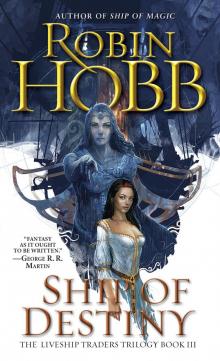 Ship of Destiny
Ship of Destiny Golden Fool
Golden Fool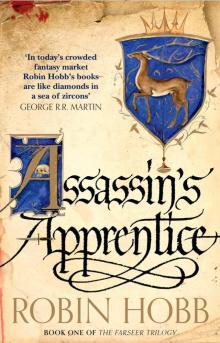 Assassins Apprentice
Assassins Apprentice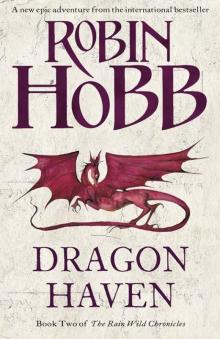 The Dragon Keeper
The Dragon Keeper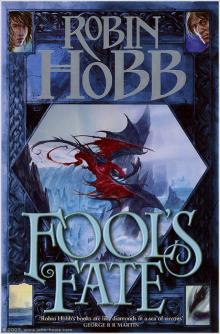 Fools Fate
Fools Fate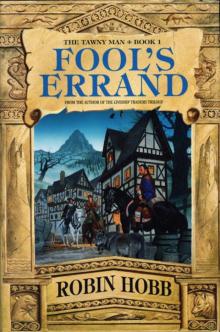 Fools Errand
Fools Errand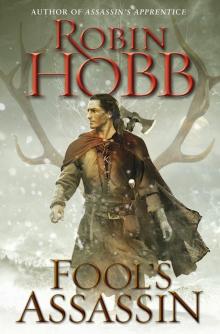 Fools Assassin
Fools Assassin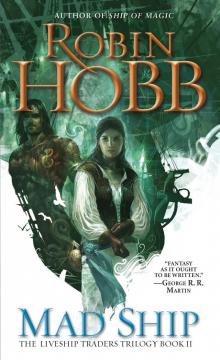 The Mad Ship
The Mad Ship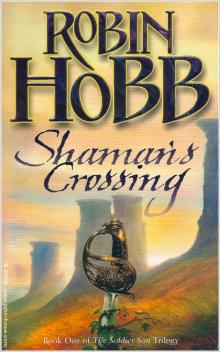 Shamans Crossing
Shamans Crossing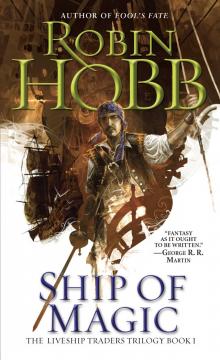 Ship of Magic
Ship of Magic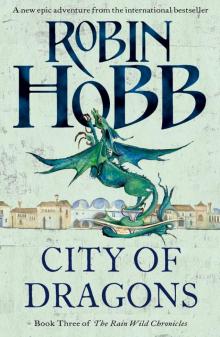 City of Dragons
City of Dragons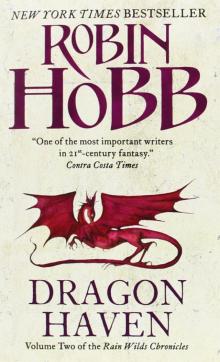 Dragon Haven
Dragon Haven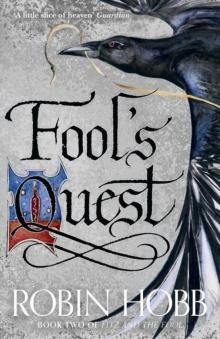 Fools Quest
Fools Quest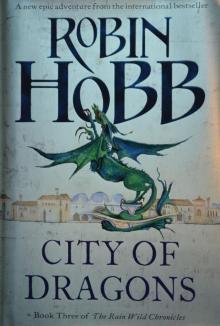 Blood of Dragons
Blood of Dragons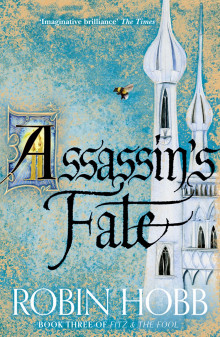 Assassin's Fate
Assassin's Fate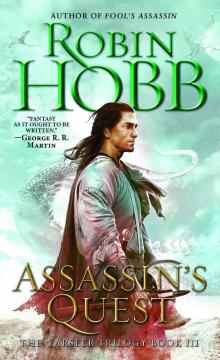 Assassins Quest
Assassins Quest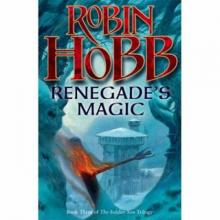 Renegades Magic
Renegades Magic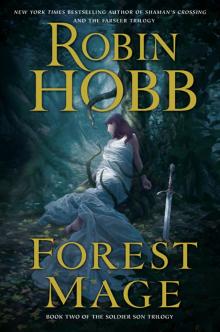 Forest Mage
Forest Mage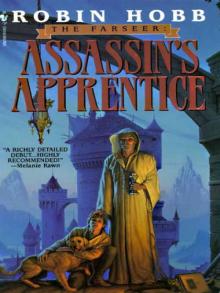 Assassin's Apprentice tft-1
Assassin's Apprentice tft-1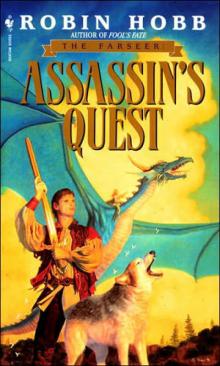 Assassin's Quest tft-3
Assassin's Quest tft-3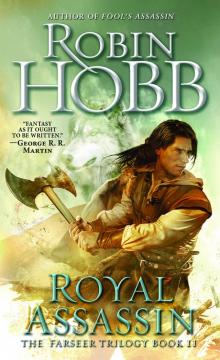 Royal Assassin
Royal Assassin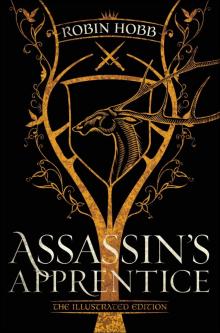 Assassin's Apprentice (The Illustrated Edition)
Assassin's Apprentice (The Illustrated Edition)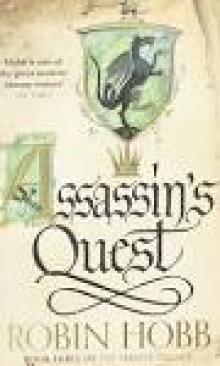 Assassin's Quest (UK)
Assassin's Quest (UK) Royal Assassin (UK)
Royal Assassin (UK)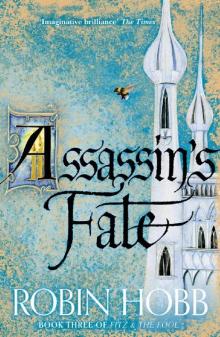 FF3 Assassin’s Fate
FF3 Assassin’s Fate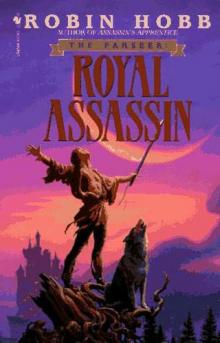 Royal Assassin tft-2
Royal Assassin tft-2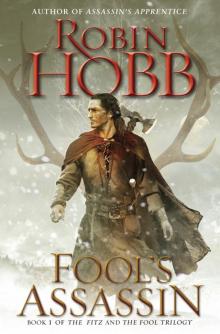 Fool’s Assassin: Book One of the Fitz and the Fool Trilogy
Fool’s Assassin: Book One of the Fitz and the Fool Trilogy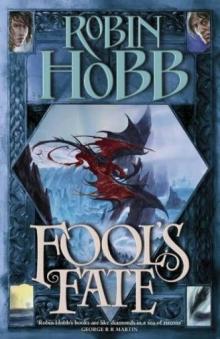 Fool's Fate ttm-3
Fool's Fate ttm-3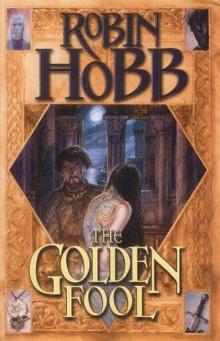 The Golden Fool ttm-2
The Golden Fool ttm-2 The Liveship Traders Series
The Liveship Traders Series The Wilful Princess and the Piebald Prince
The Wilful Princess and the Piebald Prince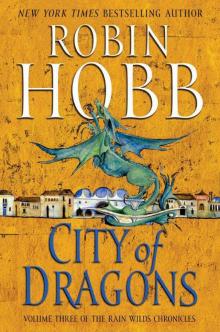 City of Dragons rwc-3
City of Dragons rwc-3 The Tawny Man 1 - Fool's Errand
The Tawny Man 1 - Fool's Errand Words Like Coins
Words Like Coins The Complete Tawny Man Trilogy Omnibus
The Complete Tawny Man Trilogy Omnibus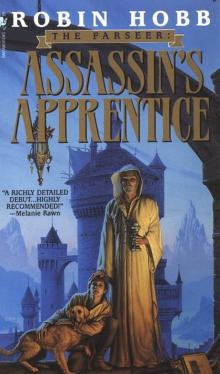 Farseer 1 - Assassin's Apprentice
Farseer 1 - Assassin's Apprentice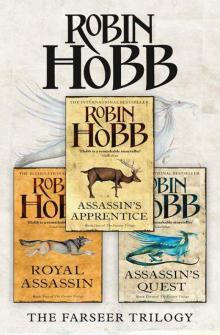 The Complete Farseer Trilogy Omnibus
The Complete Farseer Trilogy Omnibus The Soldier Son Trilogy Bundle
The Soldier Son Trilogy Bundle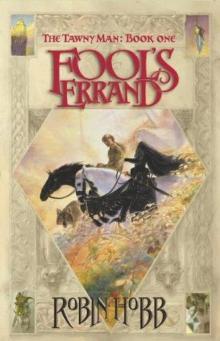 Fool's Errand ttm-1
Fool's Errand ttm-1 Blue Boots
Blue Boots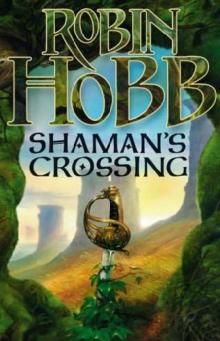 Shaman's Crossing ss-1
Shaman's Crossing ss-1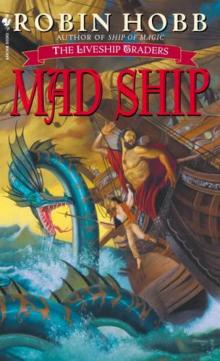 Mad Ship
Mad Ship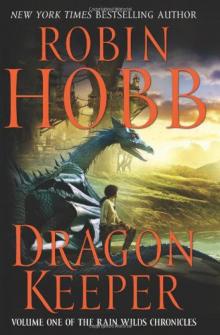 Dragon Keeper
Dragon Keeper The Willful Princess and the Piebald Prince
The Willful Princess and the Piebald Prince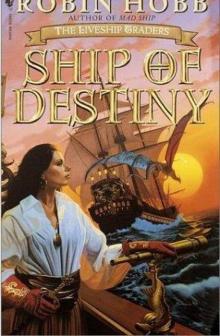 Ship of Destiny tlt-3
Ship of Destiny tlt-3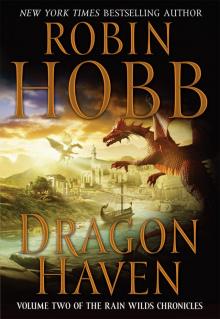 Rain Wild Chronicles 02 - Dragon Haven
Rain Wild Chronicles 02 - Dragon Haven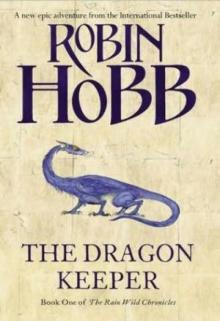 The Dragon Keeper trwc-1
The Dragon Keeper trwc-1 The Triumph
The Triumph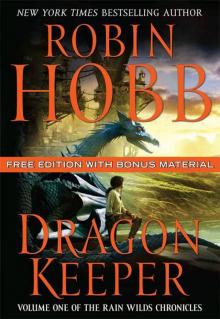 Dragon Keeper Free Edition with Bonus Material
Dragon Keeper Free Edition with Bonus Material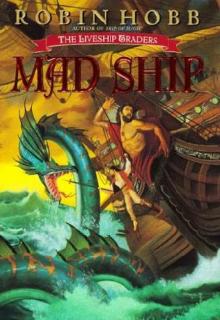 Mad Ship tlt-2
Mad Ship tlt-2 The Inheritance and Other Stories
The Inheritance and Other Stories Tawny Man 02 - Golden Fool
Tawny Man 02 - Golden Fool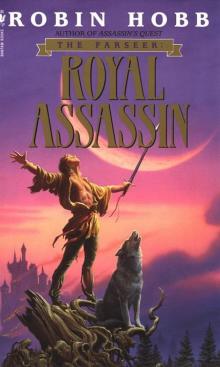 Farseer 2 - Royal Assassin
Farseer 2 - Royal Assassin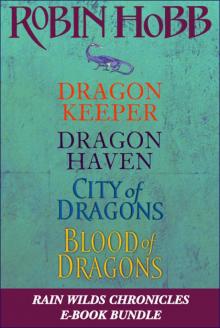 Rain Wilds Chronicles
Rain Wilds Chronicles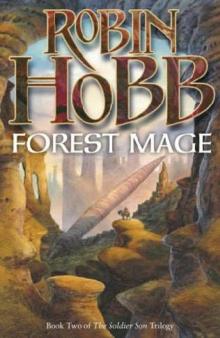 Forest Mage ss-2
Forest Mage ss-2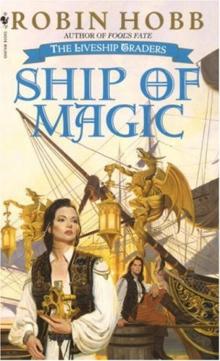 Ship of Magic lt-1
Ship of Magic lt-1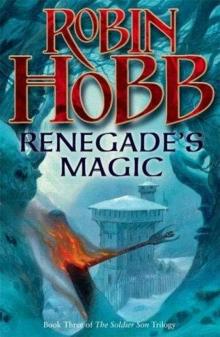 Renegade's Magic ss-3
Renegade's Magic ss-3